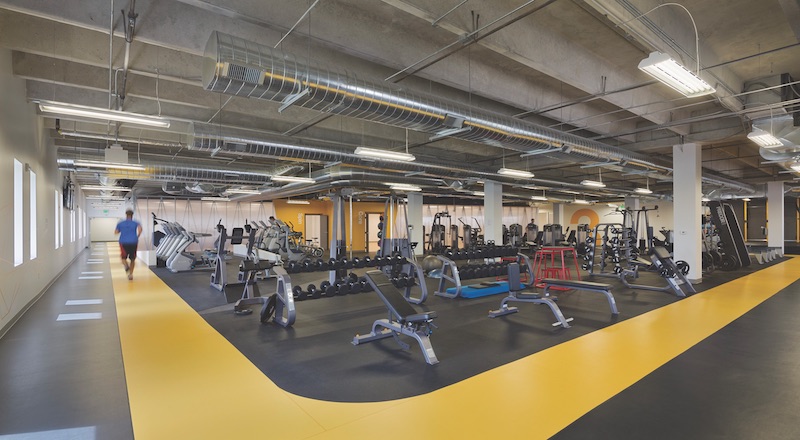Five years ago, 3form, a materials manufacturer, did a top-to-bottom remodel of its Salt Lake City headquarters campus that included adding a 14,500-sf gym, which was built with the company’s sustainable building products.
3form also instituted a policy that employees who used the gym and complied with certain health metrics would qualify for discounts on their monthly payroll contributions for healthcare coverage. In December 2018, 3form had saved so much money on healthcare costs as a result of this program that it was able to offer its employers free coverage for that month.
The savings equaled 8.3% of the workers’ gross pay in December.
Talley Goodson and Wynn Clayton, 3form’s CEO and CFO, “saw that something was happening on the horizon” about increasing healthcare costs when they approved the investment for the gym, says Christian Darby, the company’s Vice President of Design and Marketing. They took a “holistic approach” whose goal was to improve the overall health of 3form’s workforce, while controlling healthcare costs.
As of December the company employed 382 people and had a total of 909 covered under its healthcare plan. Family members can use the gym, which offers 24/7 access. The facility has eight contracted personal trainers whose jobs include evaluating the gym’s equipment each year for functionality and usage.
Beyond the gym, 3form provides its workers with an onsite doctors’ office for medical appointments, as well as blood tests and prescription refills. Services include follow-up care and counseling in the office or via telephone.
Darby says 3form has had the same healthcare provider for the past four years and into 2019. The company raised its employees’ payroll deduction for healthcare by only 3% in 2018—compared to the national average of 10-12%—and is not increasing that deduction for coverage in 2019.
Darby says participating employees are required to check in with the company’s clinic four times a year, during which 3form’s medical staff might suggest health “opportunities” for employees or their family members to pursue.
To get the discounts on premiums, employees must participate in a Health Risk Assessment to see if they fall outside of established standards for cholesterol, body mass, diabetes, asthma, hypertension, health of mind, eating habits, stress level, or tobacco use. If so, they enter a program and engage in a process that can include taking prescribed medicine or meeting with medical professionals.
In Darby’s case, the med staff found that his cholesterol was “a tad high,” he says, and established targets and a strategy to help lower it.
Related Stories
Contractors | Apr 10, 2023
What makes prefabrication work? Factors every construction project should consider
There are many factors requiring careful consideration when determining whether a project is a good fit for prefabrication. JE Dunn’s Brian Burkett breaks down the most important considerations.
Mixed-Use | Apr 7, 2023
New Nashville mixed-use high-rise features curved, stepped massing and wellness focus
Construction recently started on 5 City Blvd, a new 15-story office and mixed-use building in Nashville, Tenn. Located on a uniquely shaped site, the 730,000-sf structure features curved, stepped massing and amenities with a focus on wellness.
Architects | Apr 6, 2023
New tool from Perkins&Will will make public health data more accessible to designers and architects
Called PRECEDE, the dashboard is an open-source tool developed by Perkins&Will that draws on federal data to identify and assess community health priorities within the U.S. by location. The firm was recently awarded a $30,000 ASID Foundation Grant to enhance the tool.
Architects | Apr 6, 2023
Design for belonging: An introduction to inclusive design
The foundation of modern, formalized inclusive design can be traced back to the Americans with Disabilities Act (ADA) in 1990. The movement has developed beyond the simple rules outlined by ADA regulations resulting in features like mothers’ rooms, prayer rooms, and inclusive restrooms.
Sustainability | Apr 4, 2023
NIBS report: Decarbonizing the U.S. building sector will require massive, coordinated effort
Decarbonizing the building sector will require a massive, strategic, and coordinated effort by the public and private sectors, according to a report by the National Institute of Building Sciences (NIBS).
Legislation | Mar 24, 2023
New York lawmakers set sights on unsafe lithium-ion batteries used in electric bikes and scooters
Lawmakers in New York City and statewide have moved to quell the growing number of fires caused by lithium-ion batteries used in electric bikes and scooters.
Government Buildings | Mar 24, 2023
19 federal buildings named GSA Design Awards winners
After a six-year hiatus, the U.S. General Services Administration late last year resumed its esteemed GSA Design Awards program. In all, 19 federal building projects nationwide were honored with 2022 GSA Design Awards, eight with Honor Awards and 11 with Citations.
Mass Timber | Mar 19, 2023
A 100% mass timber construction project is under way in North Carolina
An office building 100% made from mass timber has started construction within the Live Oak Bank campus in Wilmington, N.C. The 67,000-sf structure, a joint building venture between the GCs Swinerton and Wilmington-headquartered Monteith Construction, is scheduled for completion in early 2024.
Urban Planning | Mar 16, 2023
Three interconnected solutions for 'saving' urban centers
Gensler Co-CEO Andy Cohen explores how the global pandemic affected city life, and gives three solutions for revitalizing these urban centers.
Sponsored | Cladding and Facade Systems | Mar 15, 2023
Metal cladding trends and innovations
Metal cladding is on a growth trajectory globally. This is reflected in rising demand for rainscreen cladding and architectural metal coatings. This course covers the latest trends and innovations in the metal cladding market.















